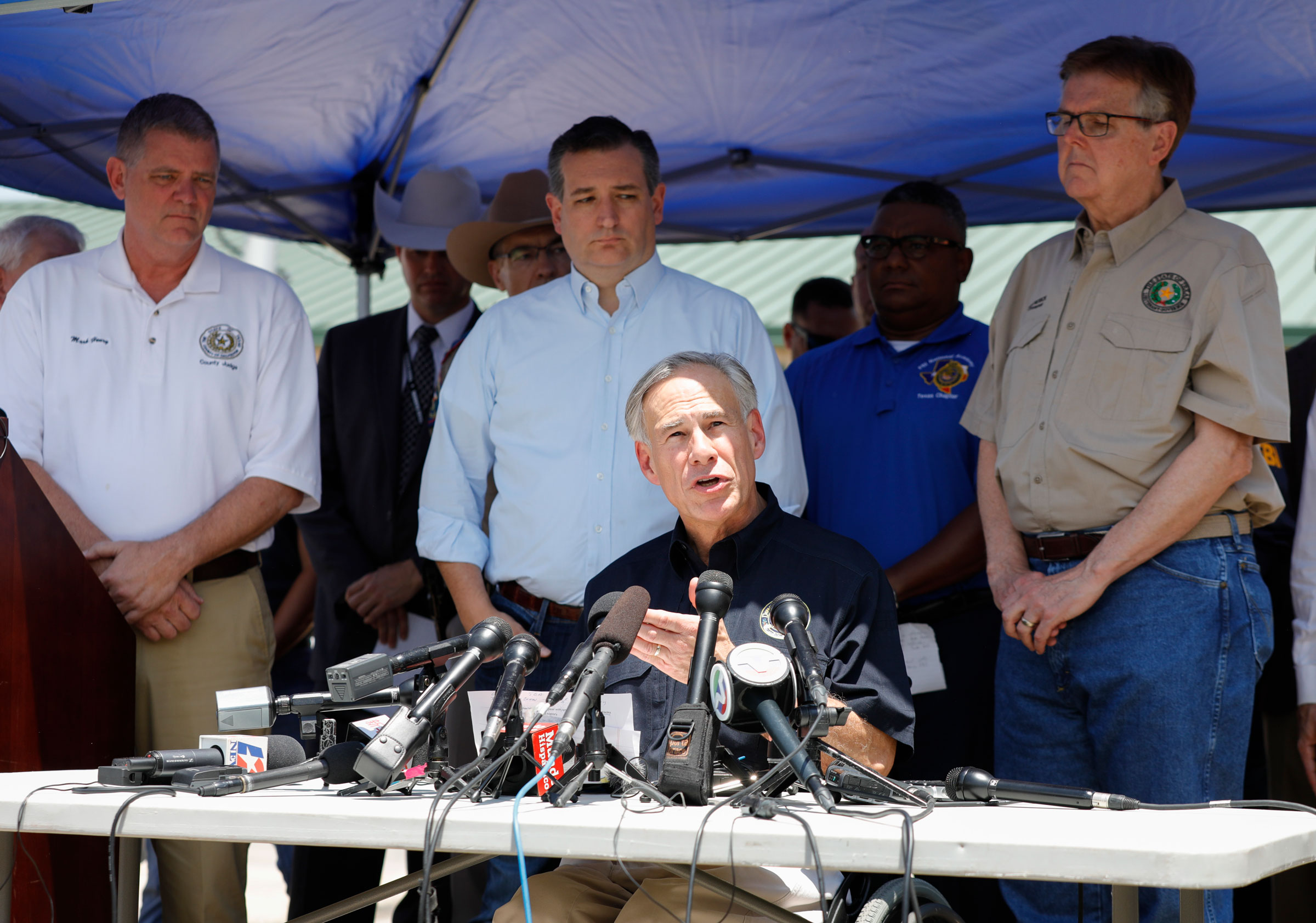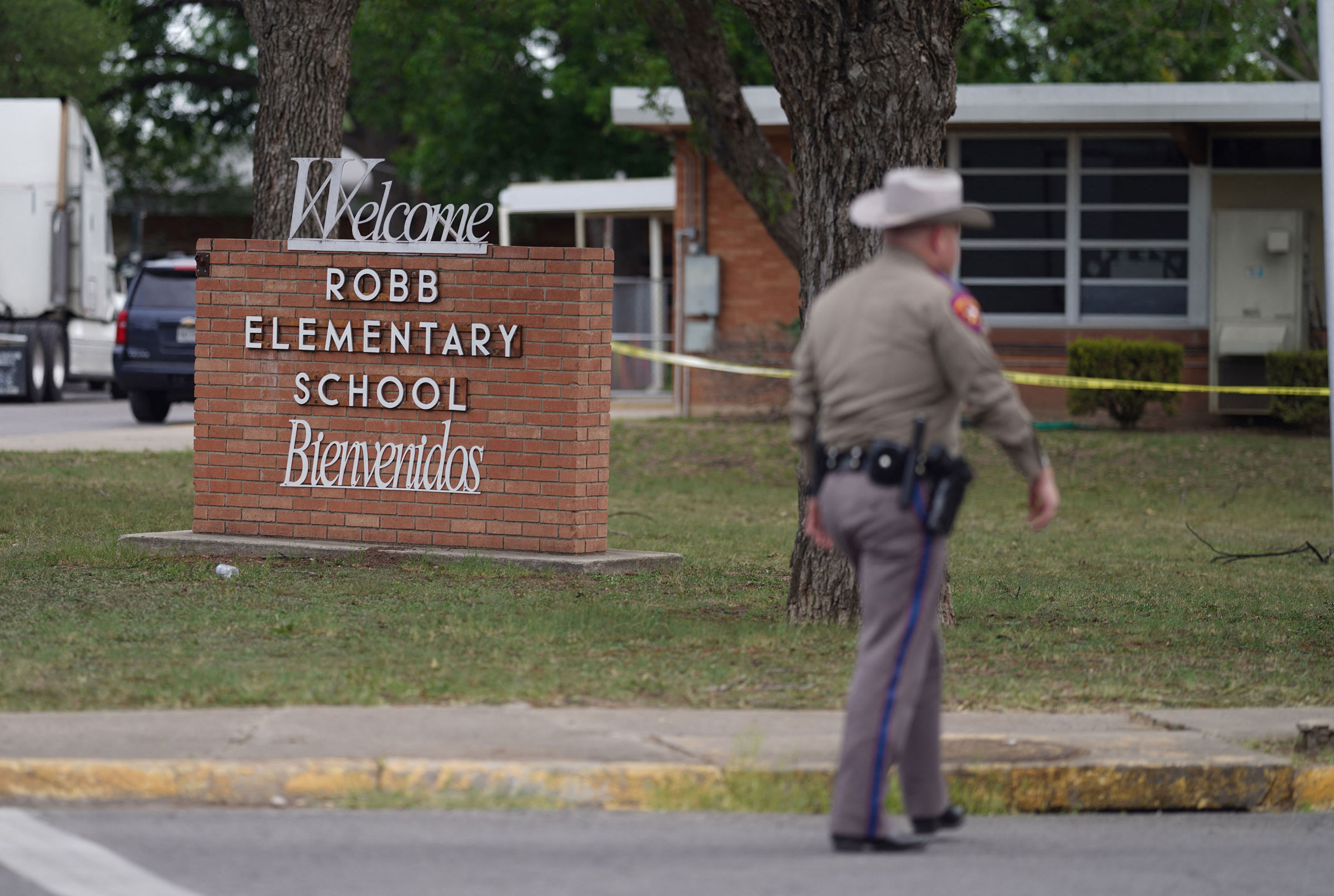Texas’ gun laws—among the most permissive in the country—have come under heightened scrutiny after an 18-year-old gunman shot and killed at least 19 children and two teachers in Uvalde, Texas on Tuesday.
Six mass shootings have occurred in Texas since 2016, and the gun control advocacy group Giffords: Courage To Fight Gun Violence rates Texas as having some of the weakest gun laws in the country, giving the laws an F grade on its Annual Gun Law Scorecard for 2021.
“Year after year, tragedy after tragedy, lawmakers in Texas not only refuse to pass life-saving gun safety laws — they actively choose to strip us of our basic public safety measures,” Shannon Watts, founder of gun control group Moms Demand Action, said in a statement to TIME.
The Texas legislature has largely relaxed gun regulation over the past decade. In 2016, the state legalized open carry of handguns and required public colleges and universities to allow handgun license holders to carry their weapons on campus. Last June, Republican Texas Governor Greg Abbott signed seven laws loosening gun restrictions even further, including a law allowing people over the age of 21 to legally carry a handgun without a license or training. Texas does not require universal background checks on all gun sales, and does not have a law restricting assault weapons. “If anything, Texas has gone the opposite of many places, in spite of the fact that several gun related massacres have occurred in the state during that time period,” says Mark P. Jones, a fellow in political science at Rice University’s Baker Institute for Public Policy.
Abbott’s office did not respond to TIME’s request for comment.
Yet polling indicates most Texas voters aren’t as far to the right on gun policy as their laws would suggest. University of Texas/Texas Tribune polls going back to late 2015 have found that pluralities or majorities of Texas voters have supported making gun control laws in Texas more strict, says Joshua M. Blank, the research director of the Texas Politics Project at the University of Texas at Austin. Yet during that time, the state’s politicians have loosened the laws instead. “There’s a disconnect,” says Blank. “[Like] other states in America, it’s not the majority of voters who are driving this discussion and the policies being produced in Texas.”
Rather, it is the power Second Amendment issues have to rally the GOP base, particularly the nearly two million GOP voters who show up to vote in Texas primaries, Jones argues. “The key to power in Texas remains the Republican primary, not the general election,” he says. “And in the Republican primary, holding positions on Second Amendment rights and gun control that are well to the right of the average Texas voter is a winning strategy.”
After past mass shootings, Texas loosened gun laws
In the past five years, Texas has experienced some of the deadliest mass shootings in the country. Republican leadership has expressed interest in tightening gun restrictions in the wake of some of the tragedies, but substantial gun control policies have never gained momentum in the Texas legislature, which meets every two years.
In 2018, after a 17-year-old gunman killed 10 people and injured 13 more at a school shooting in Sante Fe, Abbott called on lawmakers to look into a “red flag” law, which would allow local officials to take firearms away from someone if a judge declares them a danger to themselves or others. But a few months later, Abbott said he saw a “coalescence” against the proposal by lawmakers. When the legislature convened for the 2019 session, they instead enacted laws that strengthened mental health resources for children, bolstered emergency response training for teachers, and increased how many school marshals can carry guns on public school campuses.

Months after the legislative session had ended, in August 2019, 30 people were killed in two mass shootings in El Paso and Odessa. In the following days, the Governor and Lt. Governor Dan Patrick—both Republicans—spoke about expanding background checks for gun purchases, after it was reported that the Odessa shooter had failed a previous background check and bought his weapon via a private sale. But it was another two years until the Texas legislature reconvened in 2021. When it did, the issue had lost traction among lawmakers, despite its continued support among voters; a June 2021 University of Texas/Texas Tribune poll that found 55% of Texans strongly supported background checks on all gun purchases, while 11% strongly opposed them.
Facing increasing pressure from the right ahead of his 2022 primary, Abbott signed a law during the 2021 session that conservative activists had long sought, which allows Texans to carry handguns without requiring a license or training. In laying out his policy priorities in February 2021, Abbott said that Texas must become a “Second Amendment sanctuary state.”
“What the last session showed was that the desires of an intense minority in the Republican Party in Texas is enough to push public policy,” says Blank of the Texas Politics Project, noting that redistricting has solidified red districts in the state and made GOP primaries more competitive. “And in Republican primaries, simply maintaining the status quo is never going to be enough when facing activated constituencies and challengers looking to exploit them.”
Will Uvalde lead to reforms?
In the wake of the school shooting in Uvalde, gun control advocates are once again demanding action.
Abbott told reporters on Wednesday that the alleged shooter used an AR-15 assault rifle to carry out the attack, a revelation that could put “at least some Republicans on the defense,” says Jones, given that many Democrats, including Beto O’Rourke, the former U.S. Representative running for Governor of Texas, have called for bans on AR-15s and assault rifles.

Georgina C. Pérez, a Democrat on the Texas State Board of Education representing a massive district that includes Uvalde, says she is a believer in Second Amendment rights, as are many other people in her community. But she has had three mass shootings in her district since 2019—two in schools— and she believes many voters in her area would also support gun control measures. “Do you know how many Democrats live on the border who are proud veterans, NRA card-carrying strong supporters of their own Second Amendment [rights]?” says Pérez, who lives in a town outside El Paso so small it doesn’t have a traffic light. “A whole bunch of us in the same communities where these things keep happening… We’re gun owners too, but we don’t need semi-automatic rifles for anything, and we definitely don’t have a problem with background checks and safety measures in our schools. Those things can be true at the same time.”
But whether reform can gain traction in the Texas legislature, which doesn’t reconvene again until 2023, remains to be seen.
An October 2021 University of Texas/Texas Tribune poll found that 67% of voters who identified as “strongly Republican” expressed at least some approval for how state leaders and the legislature have handled gun violence in Texas in the past. Blank of the Texas Politics Project says the share of Texas voters who support stricter gun laws has remained consistent, and stayed the same in polls conducted in February 2019 and October 2019, despite the El Paso and Odessa shootings in between.
“As horrific as the most recent tragedy is, it seems unlikely to fundamentally shift the debate in Texas without a sustained effort on the part of those looking to strengthen Texas’ gun laws,” Blank says, “or at least keep them from getting even more lenient.”
-With reporting by Janell Ross/New York
More Must-Reads from TIME
- Cybersecurity Experts Are Sounding the Alarm on DOGE
- Meet the 2025 Women of the Year
- The Harsh Truth About Disability Inclusion
- Why Do More Young Adults Have Cancer?
- Colman Domingo Leads With Radical Love
- How to Get Better at Doing Things Alone
- Michelle Zauner Stares Down the Darkness
Write to Madeleine Carlisle at madeleine.carlisle@time.com